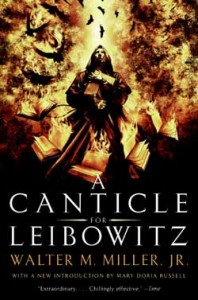And what makes you think the Memorabilia is completely free of pap? Even the gifted and Venerable Boedullus once remarked scornfully that about half of it should be called the Inscrutabilia. Treasured fragments of a dead civilization there were indeed-but how much of it has been reduced to gibberish, embellished with olive leaves and cherubims, by forty generations of us monastic ignoramuses, children of dark centuries, many, entrusted by adults with an incomprehensible message, to be memorized and delivered to other adults.
The monks in the post-apocalyptic sci fi novel A Canticle for Leibowitz are in approximately the same position as scholars in most D&D worlds. They’re inheritors of a fallen civilization they don’t fully understand. Whether your fallen civilization is 20th century Earth or Bael Turath, books from the past age are precious – and, in another way, irrelevant. A single ancient book of pre-cataclysmic magic might do the PCs no good, just as a modern book on electronics wouldn’t do a medieval scholar any good: in this book, too much knowledge is taken for granted.
A library, on the other hand, is a different thing. When I DM, I tend to put treasures in libraries, because that’s a natural place to find powers from past ages. I tend to be interested in mechanics for performing research, and in powerful wizard spells as treasure (as, indeed, they were in previous editions). I haven’t quite figured out the perfect mechanics yet, but I do want to find a way to make players greedy for ancient spells and secrets. For now, I plan to use my ideas for spells as treasure.
Tags: everybook








[…] of their existence exist, they are in incomplete and obscure form, like the scientific learning in A Canticle for Leibowitz.) Generally, a civilization can't research such powerful spells until they have a greater academic […]